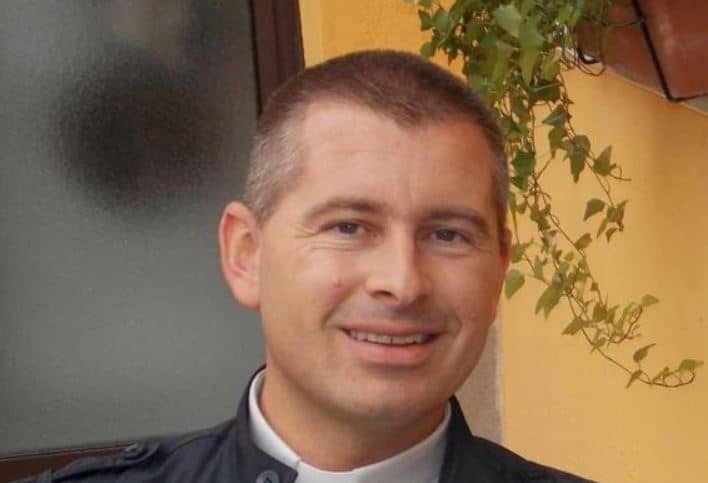ROME — Faith in the reconciling power of the cross and in God’s great desire to forgive human sin is a call to set aside fear and make a commitment to conversion — on a personal and societal level, said Father Michael A. Perry, minister general of the Franciscans.
Opening the annual celebration Aug. 1 of the “Pardon of Assisi,” a special indulgence granted since 1216, Perry insisted reconciliation with God means reconciling with one’s brothers and sisters and with all of creation.
The U.S.-born head of the worldwide Franciscan order used the death of George Floyd, a Black man who died at the hands of white police officers in Minnesota, as one example of “social and institutional sin” believers must confront if they are serious about conversion and reconciliation.
“God is calling us through this great celebration of the Pardon of Assisi to abandon all that leads to death, all that robs us of God’s mercy, pardon, peace and joy,” he said at Mass in the Basilica of St. Mary of the Angels in Assisi. “We are invited to live as beloved children of a loving God, destined for freedom, destined for love, destined for God.”
After reciting the Angelus prayer at the Vatican Aug. 2, Pope Francis encouraged Catholics to take advantage of the indulgence, “the spiritual gift that St. Francis obtained from God through the intercession of the Virgin Mary.”
“It is a plenary indulgence that may be received by partaking of the sacraments of reconciliation and the Eucharist and visiting a parish or Franciscan church, reciting the Creed, the Lord’s prayer and praying for the pope and his intentions,” Francis explained.
“How important it is to always put God’s forgiveness, which ‘generates heaven’ in us and around us, back at the center” of one’s life, the pope said. Pardon comes from “the heart of God, who is merciful.”
In his homily in Assisi, Perry noted how different the 2020 celebration was because of the COVID-related limitations on travel and on public gatherings, not to mention the mental and spiritual impacts of the disease and the lockdowns meant to curb it.
“We cover our faces with masks; we maintain social distance from each other; we walk about in fear of the invisible enemy; fewer pilgrims are gathered in this sacred space this year for our pilgrimage celebration,” he said.
At the same time, he said, the pandemic “has also opened the eyes of more people — and I hope it has opened the eyes of those of us gathered here in prayer — to the deep, longstanding, social and ecological wounds simmering just below the surface in most if not all societies.”
While people in what can be called the “privileged classes” may not have noticed previously, he said, “this is not the case for those who are counted among the ‘minority,’ who have experienced serious social infirmity and tribulations on a daily basis for most of their lives.”
“This was demonstrated most clearly by the cruel murder of George Floyd, an innocent Black man in Minneapolis, Minnesota, United States, who was held down by the police in a choke hold,” Perry explained to the mainly Italian congregation. “Despite his plea for mercy, for oxygen — eight minutes and 46 seconds, ‘I can’t breathe’ — no mercy was shown by those entrusted with the duty to save lives.”
Injustice like the death of George Floyd is not a sin limited to the United States, the Franciscan said. Similar incidents occur “in England, France, Italy, India, South Africa, Brazil, to name only a few places (where) people have systematically been excluded and reduced to a life of chronic poverty. Millions of people ‘can’t breathe’ because of the color of their skin, the social class to which they have been assigned, because of their religious convictions or their sexual orientation.”
While sacramental penance and the tradition of indulgences have focused on individual sins, he said St. Francis of Assisi clearly knew suffering and tribulations were experienced not only on a personal level.
“The spiritual insight of St. Francis, his cry for mercy, pardon and reconciliation also has a social dimension that, if embraced and followed, will produce within each of us a profound conversion,” Perry said. “This conversion will produce the fruits of an authentic, just, merciful and joy-filled life as disciples and co-missionaries with Christ, with Mary and with St. Francis.”
The pandemic also is calling people’s attention to economic injustices and to environmental destruction, he said.
“Those who control the forces of economic production and distribution — the multinational corporations — are getting richer at an alarming rate, even in these uncertain times of the pandemic,” he said, “while the poor, the excluded, people of color are becoming poorer, marginalized, pushed to the brink of survival at an alarming rate.”
Participating in the “Pardon of Assisi,” he said, should be a sign of seeking “the way back toward God, toward one another, toward ourselves and toward creation. We come as brothers and sisters, carrying in our hearts, our minds and our bodies every living creature, so that all might participate in the liberating power of God’s reconciling love.”
















